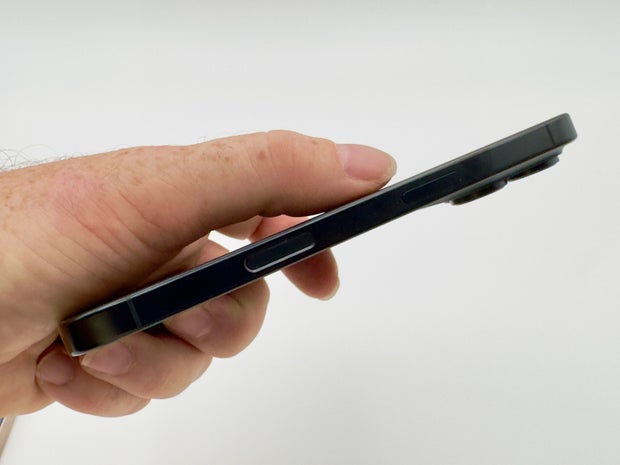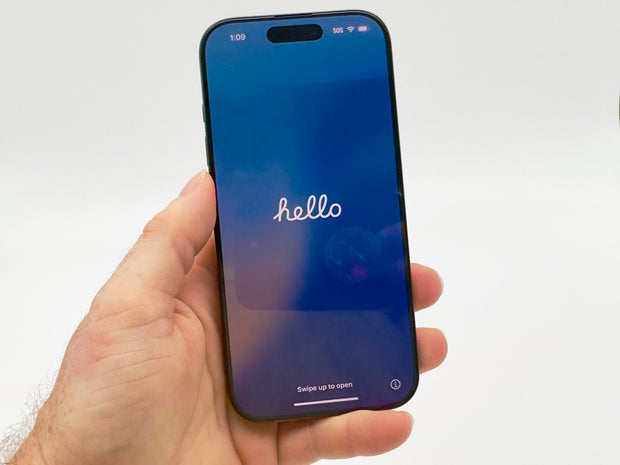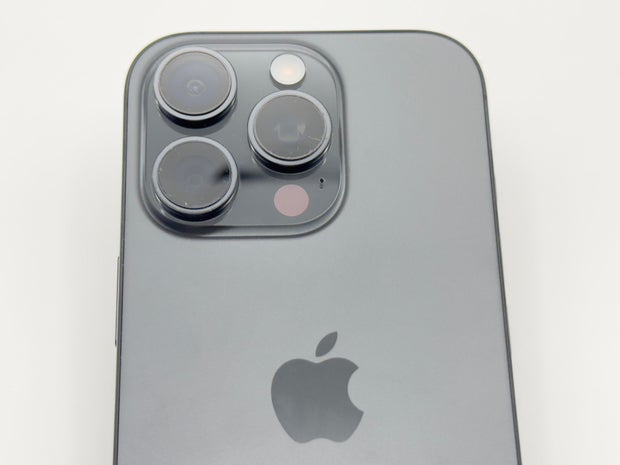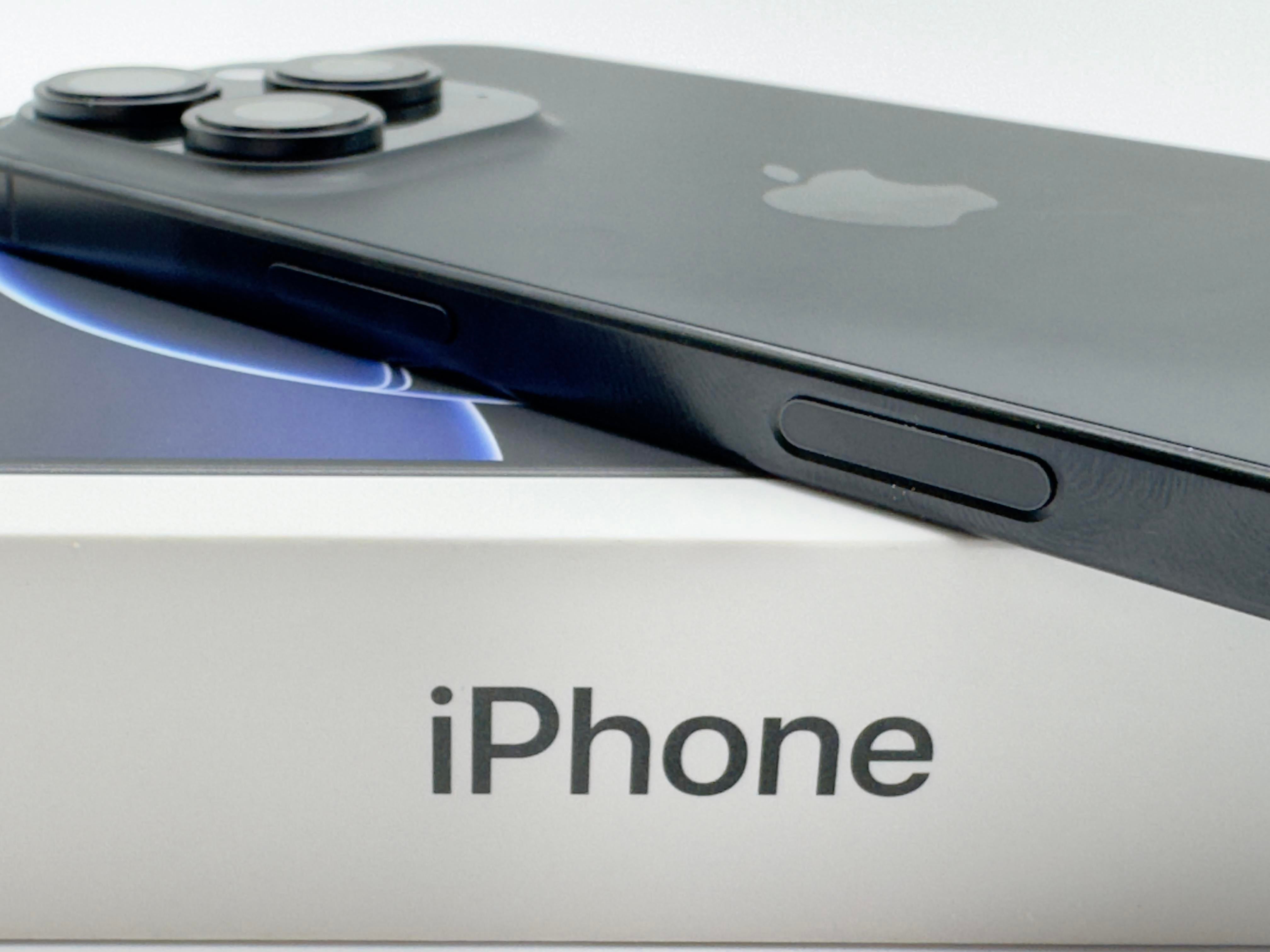Tech
Apple iPhone 16 Pro review: A lot of power in a pocket-friendly package

Apple
Fall is here, which means one thing in the world of Apple — it’s time for new smartphones. This year, Apple didn’t disappoint with the launch of four new iPhones. There’s the lower-end iPhone 16 and the slightly upgraded iPhone 16 Plus. The two higher-end models include the iPhone 16 Pro and iPhone 16 Pro Max.
So what’s the difference between these phones? It comes down to display size, processor speed and battery life. All four models run the same version of the iOS 18 operating system, come with the same apps, and support all of Apple’s services (including Apple Music, Apple iCloud, Apple TV+ and Apple Fitness+).
Jason R. Rich
The lower-end iPhone 16 is ideal for the average user who wants a smartphone with a 6.1-inch Super Retina XDR display and that’s loaded with all of the features people love about the iPhone. The iPhone 16 Plus is basically the same as the iPhone 16, but with a larger, 6.7-inch display. These two phones run using the Apple A18 processor.
For people who want more power, faster performance and a better camera system, there’s the iPhone 16 Pro and iPhone 16 Pro Max (which we’ve also reviewed). The biggest difference between these two phones is screen size. The iPhone 16 Pro offers a 6.3-inch display, while the iPhone 16 Pro Max offers a stunning 6.9-inch display. These two phones have three rear-facing cameras and run using Apple’s A18 Pro processor (a faster and more powerful version of the basic A18 chip).
AT&T provided me with an iPhone 16 Pro in the black titanium casing color and with 128GB of internal storage to review. As a current iPhone 16 Pro Max user, I was able to compare the two phones and put the iPhone 16 Pro to the test. Keep reading to discover if it’s worth upgrading your iPhone to the iPhone 16 Pro.
Who should buy the Apple iPhone 16 Pro?
The Apple iPhone 16 Pro is best for someone who wants the more advanced processing power and enhanced performance that a “Pro” model iPhone can offer (thanks to the Apple A18 Pro processor), but who also wants a phone with a more compact size that easily fits in a hand or pocket. This phone includes many of the enhancements built into the top-of-the-line iPhone 16 Pro Max, but with a smaller Super Retina XDR. This smaller display results in a more compact and lighter phone overall, which many users desire.
While people looking for an entry-level iPhone should consider the lower-cost iPhone 16, the iPhone 16 Pro is most suitable for average users who want higher-end camera capabilities built into their phone.
iPhone 16 Pro: At a glance
Jason R. Rich
Display size: 6.3 inches | Display type: Super Retina XDR touchscreen | Display resolution: 2,622 x 1,206 pixels (460 pixels-per-inch) | Refresh rate: Up to 120Hz | Max. display brightness: 2,000 nits | Processor: Apple A18 Pro | Available colors: Black titanium, white titanium, natural titanium, desert titanium | Dimensions: 5.89 x 2.81 x 0.32 inches | Weight: 7.03 ounces | Storage options: 128GB, 256GB, 512GB or 1TB | Port: USB Type-C 3.2 | Wireless connectivity: 5G, Wi-Fi 7, Bluetooth 5.3 | Battery life: Up to 27 hours (video playback) | Operating system: iOS 18 | SIMs: Dual eSIM | Waterproof rating: IP68 | Front camera: 12MP TrueDepth | Rear cameras: 48MP Fusion (main), 48MP (ultra-wide), 12MP (telephoto) | MagSafe compatible: Yes
Pricing: $999 (128GB), $1,099 (256GB), $1,299 (512GB), $1,499 (1TB) – Before trade-in, promotions or financing offers.
The iPhone 16 Pro includes the new Camera Control button on side of the phone. Later in the fall, it will also offer Apple Intelligence — AI-driven features and functions that Apple will be integrating into all of the latest iPhone models. As for the camera setup, most built in features and functionality offered by the iPhone 16 Pro and iPhone 16 Pro Max are virtually identical.
The A18 Pro chip will appeal to people who use their phone to handle tasks that require that extra boost of processing power and speed, like playing the latest, graphic-intensive games or editing 4K resolution video. The iPhone 16 Pro is IP68 rated for water resistance. It can serve as a powerful communications devices, as well as feature-packed productivity, entertainment, health/fitness and safety tool. Plus, it works nicely as a high-end still image or video camera that’s able to capture up to 4K (120fps) content.
The iPhone 16 Pro provides up to a 27-hour battery life between charges, compared to the up to 33 hours you get with the iPhone 16 Pro Max. Thanks to the quick-charge feature, in just 30 minutes, you can go from 0% to 50% battery charge.
Apple iPhone 16 Pro: Photography and videography
Jason R. Rich
While the physical size of the iPhone 16 Pro is smaller than the iPhone 16 Pro Max, the camera setup within both phones is basically the same. This means on the back of the handset, you get a 48MP Fusion camera, a 48MP ultra-wide camera and 12MP telephoto camera. These cameras are capable of .5x, 1x, 2x or 5x optical zoom and up to 25x digital zoom. The macro (extreme close-up) photography capabilities have also been enhanced, compared to last year’s phone. Plus, I noticed improvements in optical image stabilization, faster focusing, improved low light shooting and much better depth control.
And when it comes to video, it’s now possible to shoot at up to 4K resolution (120 frames-per-second) using Dolby Vision, plus take advantage of features like Cinematic mode, Action mode, spatial video recording, ProRes video recording, improved slow-motion, better time-laps and more. As you’re shooting video, the iPhone 16 Pro can also capture spatial audio using its four microphone array that’s equipped with wind noise reduction and other new audio capabilities.
Jason R. Rich
Thanks to the new Camera Control button, the iPhone 16 Pro performs more like a traditional point-and-shoot camera than ever before. This physical button can be used to quickly launch the Camera app, adjust the app’s settings, and then work as a shutter button. Of course, all of the camera controls and options previously available via the touchscreen continue to be offered. Thus, the Camera Control button simply provides an alternative and optional way to work with the Camera app.
5 differences between the iPhone 16 and iPhone 16 Pro
- The iPhone 16 has a 6.1-inch display, while the iPhone 16 Pro features a 6.3-inch display.
- The iPhone 16 and iPhone 16 Plus run using the Apple 18 chip, while the iPhone 16 Pro and iPhone 16 Pro Max are equipped with the faster and more powerful A18 Pro chip.
- The iPhone 16 Pro offers 128GB, 256GB, 512GB or 1TB of internal storage, while the basic iPhone 16 offers 128GB, 256GB or 512GB of internal storage (with no 1TB option).
- The resolution of the iPhone 16 is slightly lower than what’s offered by the iPhone 16 Pro — 2,556 x 1,179 pixels versus 2,622 x 1,206 pixels pixels.
- The iPhone 16 offers two rear-facing cameras, while the iPhone 16 Pro has three rear-facing cameras, so users get more creative control and option when taking pictures or filming video.
Is the iPhone 16 Pro worth it?
With the exception of the Camera Control button, the differences between last year’s iPhone 15 Pro and this year’s iPhone 16 Pro are minimal. If you plan to upgrade from an iPhone that’s at least three or four years old, you will notice a dramatic increase in performance if you upgrade to the iPhone 16 Pro. However, this performance boost is much less noticeable between the iPhone 15 Pro and iPhone 16 Pro.
Having tested a wide range of apps on the iPhone 16 Pro, including several graphic-intensive games, for an average user, this phone’s overall performance did not disappoint. And the camera setup, when used with the Camera and Photos apps, offers some worthwhile enhancements.
For a typical user planning to switch from an Android phone to an iPhone, the iPhone 16 Pro is a good option. It offers the size, performance and overall functionality anyone could want from a smartphone, plus a slightly better camera system compared to the iPhone 15 Pro.
Keep in mind, any older model iPhone that’s able to run iOS 18 will benefit from the new features and functions added to the operating system and the iPhone’s collection of preinstalled apps. And later in the fall, all of these iPhones will support the Apple Intelligence artificial intelligence functionality that Apple has promised. So if you upgrade from an iPhone 15 Pro to an iPhone 16 Pro, the main addition is just the Camera Control button.
This years upgrades to the iPhone 16 lineup, including the iPhone 16 Pro, are incremental at best. So, the question isn’t whether you need to upgrade your phone, it’s more a matter of whether you want to upgrade your iPhone. For some users, what you’ll get for the additional money may not be worth it, especially if you’re already happy with your current iPhone’s performance.
- Design: The smaller size of the iPhone 16 Pro makes it easier to carry the phone in a pocket, without compromising functionality, compared to the iPhone 16 Pro Max.
- Performance: The Apple A18 Pro processor performs faster than the A17 chip used by the iPhone 15 Pro, as well as the A18 chip found in the iPhone 16 or iPhone 16 Plus. This additional speed and processing power will potentially be beneficial when using Apple Intelligence functionality, but for everyday tasks, it makes little difference.
- Value: The base model of the iPhone 16 Pro costs $200 more than the base model of the iPhone 16. What you get for this extra investment is slightly better battery life, a slightly larger and higher resolution display, and a significantly better camera setup. So if you plan to use the phone often for taking pictures and shooting video, the better camera setup offered by the iPhone 16 Pro is well worth it.
- AI integration: The NPU is certainly powerful, but how well Apple integrates Apple Intelligence into iOS 18 and core apps is yet to be seen.
Will Apple Intelligence make the phone worth it?
At the moment, that’s a difficult question to answer, since Apple Intelligence will not be introduced into any iPhones until later this fall. However, what we expect is a more personalized Siri digital assistant that not only understands what’s being said, but also the context that’s used when making requests or asking questions.
Apple Intelligence will allow apps to more seamlessly work together and exchange relevant information in a way that can streamline common tasks, while helping users maintain their privacy and security. Apple Intelligence will also help with composing text. When used as an audio recording device, it will be able to transcribe and then summarize recordings. AI assisted language translations and more seamless scheduling and to-do list management have also been promised.
For someone who takes a lot of pictures or shoots video, Apple Intelligence introduces easier to use and more powerful image enhancement and editing tools, including a new Clean Up feature in the Photos app that allows users to easily remove objects from their photos. Comparing just this feature to what’s possible using the latest Android phones, unfortunately, it’s not as impressive. Current AI features assist in the actual picture taking or video shooting process to ensure the best possible results.
That said, Google’s Gemini AI tools, Samsung’s Galaxy AI and Microsoft Copilot — all of which are currently available — have set rather high standards for what consumers should expect from AI functionality in their computers and mobile devices.
For in-depth reviews of the Apple iPhone 16 Pro Max, Google Pixel 9, Google Pixel 9 Pro, Google Pixel 9 Pro XL, Samsung Galaxy Z Flip 6, Samsung Galaxy Z Fold 6, Apple iPhone 15 Pro Max, OnePlus 12 and other popular phones, check out our ever-expanding tech coverage. And if you’re planning to invest in new Apple AirPod earbuds for your new phone, refer to our 2024 Apple AirPods buyer’s guide to help you choose which model earbuds are best for you.














